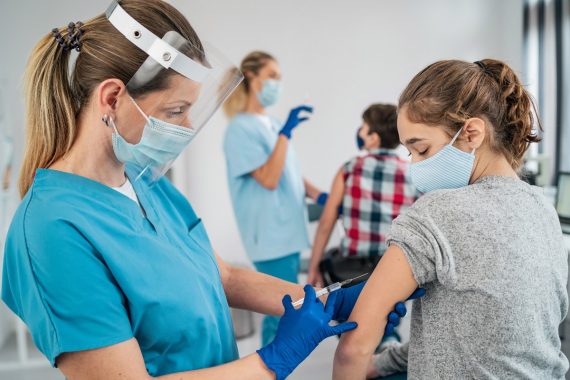Spread among young people drives 50% rise in Covid infections

Covid infections are now doubling every 11 days in England, driven by infections in younger age groups, the latest findings from the REACT-1 study show.
PCR tests on almost 109,000 volunteers taken between 20 May and 7 June show the R number is at 1.44 and infections in England have increased 50% since the last study round in April.
The Delta variant is driving in the increase with the highest prevalence seen in those aged 5-to-12 years and 18-to-24 years, the study from Imperial College London and Ipsos MORI shows.
Overall prevalence in the under-50s was 2.5 times higher at 0.20% compared with those aged 50 or over which was 0.08% highlighting the benefits of vaccination.
The researchers said the link between infection rates and deaths started to weaken in February. When it comes to hospital admissions, the picture is more complex except in the over-65s who are more likely to be fully vaccinated.
Variation in infection rates was seen around the country with the highest prevalence in the North West at 0.26% compared with 0.05% in the South West. In all the prevalence in England was 0.15% up from 0.10% when the study was last done five weeks previously.
It comes amid media reports, including from the BBC, that the Joint Committee on Vaccination and Immunisation are unlikely to recommend routine Covid-19 vaccines for all teenagers, at least any time soon.
The Pfizer vaccine is now licensed for use in 12-to-17 year olds in the UK and the JCVI are expected to announce soon its recommendations for use in younger age groups. The ‘finely balanced’ decision will need to take into account safety data, the overall benefits to children but also ethical considerations around using vaccines that could go to older populations around the world.
Figures from Public Health England published earlier in the week suggested that the AstraZeneca vaccine is 92% effective and the Pfizer vaccine is 96% effective against hospitalisation from the Delta variant after two doses.
Responding to the REACT study findings, health secretary Matt Hancock urged people to get both doses of the vaccine: ‘Cases are now rising, but thanks to our incredible vaccination programme and enhanced response package including surge testing, we have the tools to curb the spread of this virus.’
Professor Paul Elliott, director of the REACT programme, said: ‘We found strong evidence for exponential growth in infection from late May to early June in the REACT-1 study, with a doubling time of 11 days on average for England.
‘These data coincide with the Delta variant becoming dominant and show the importance of continuing to monitor infection rates and variants of concern in the community.’
Portfolio careers
What is the right portfolio career for you?

Visit Pulse Reference for details on 140 symptoms, including easily searchable symptoms and categories, offering you a free platform to check symptoms and receive potential diagnoses during consultations.
Related Articles
READERS' COMMENTS [1]
Please note, only GPs are permitted to add comments to articles












fancy that !!
you get a highly contagious virus, and tip it onto the population.
after you’ve immunised all those likely to die from it, you encourage all the young, fit, unimmunised, socially mobile party goers to go out, mix, drink, and hug each other after they have been cooped up for months.
let’s all go to the football, or gigs as well, just to ensure a nice even spread of virus.
and guess what………………..”the virus is spreading like wildfire” !!!
fancy that ! who could have predicted that ?!